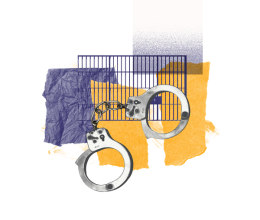NEW ORLEANS – A sweeping new report released by the American Civil Liberties Union of Louisiana today shows that after a 10.3 percent increase, Louisiana’s pretrial incarceration rate is now three times the national average and the highest of any state on record since 1970. The study, based on an analysis of thousands of jail records, found that 57 percent of people in jail had been arrested for non-violent offenses and that pretrial incarceration costs Louisiana taxpayers nearly $290 million per year. On average, the people represented in the study had been held behind bars for 5 and a half months – without trial or conviction.
Pointing to such excessive jail stays as a driver of Louisiana's ballooning jail population, the report recommends a set of comprehensive reforms, including shortening the amount of time between when an individual is arrested and when they are charged.
“These findings are a wakeup call that even as Louisiana has worked to reduce its prison population, a devastating epidemic of pretrial incarceration has risen up in its wake,” said Alanah Odoms Hebert, ACLU of Louisiana executive director. “Over the past five years, the number of Louisianans being jailed before trial has risen sharply – with devastating consequences for our families and communities. The people trapped in this broken system are overwhelmingly Black, overwhelmingly poor, and most are accused of non-violent offenses and simply cannot afford to buy their freedom. Pretrial incarceration destroys lives, wastes taxpayer money, weakens public safety, and betrays the fundamental principle that people are innocent until proven guilty. This is unacceptable – and our elected officials have a responsibility to fix it now.”
State Representative Ted James (D-Baton Rouge) has introduced two bills to address these issues and shorten the length of time between when someone is arrested and when they are charged. HB 120 would require the state to file charges in misdemeanor and most felony cases within five days, or release a person from jail. Under current law, prosecutors in Louisiana have between 45 and 60 days to bring formal charges against a person accused of most crimes and an additional month before arraignment.
“It's unacceptable that Louisiana locks its people up without trial or conviction more than any other state, and mostly for non-violent offenses,” said Rep. James. “State and local officials need to act right now to start building a system based on safety and fairness, not how much money a person has.”
Rep. James has also introduced HB 522 to establish transparency in the state’s jail system by requiring parish jails to collect standard data on their pretrial jail populations and submit quarterly reports.
Among the key findings from the report:
- Louisiana’s pretrial incarceration rate has grown 10.3 percent since 2015.
- Pretrial incarceration costs Louisiana taxpayers nearly $290 million per year.
- Among the jail records obtained for the report, the average length that a person had been behind bars, with no trial or conviction, was 5 ½ months.
- Black Louisianans are more than twice as likely to be jailed pretrial than white Louisianans.
- Black boys and men aged 15-24 are 5 times more likely to be jailed following arrest than white boys and men of the same age.
- Overall, Black Louisianans in the survey sample had spent 36 percent more time in jail pretrial than white Louisianans.
- The median bail for a person held pretrial in Louisiana is $24,000.
- Drug possession was the most common charge of people incarcerated pretrial in Louisiana, and 57 percent of people in jail had been arrested for non-violent offenses.
“Even a few days in jail can cause someone to be fired from a job, be evicted from their home, and even lose custody of their children,” said Chris Kaiser, ACLU of Louisiana Advocacy Director. “The people we interviewed for this report shared heartrending stories of lives shattered, jobs lost, and families separated by this cruel and unjust system. Fortunately, we know that it doesn’t have to be this way. State and local officials can act right now to reverse Louisiana’s pretrial incarceration epidemic.”
The report recommends a sweeping set of reforms, including:
State Level Recommendations
- Reducing the time to charge and arraignment by shortening the period of time the state has to file charges and bring the person before a judge for arraignment.
- Requiring standardized reporting of pretrial jail data from every parish.
- Reducing arrests by requiring a statutory presumption of summons in lieu of arrest for most misdemeanors and some felonies.
- Ending the use of unconstitutional one-size-fits-all bail schedules
- Implementing constitutional standards for setting bail and strengthening procedural protections against unaffordable bail and unwarranted pretrial incarceration
- Eliminating blanket prohibitions on judges releasing certain persons on personal recognizance or unsecured bail.
- Requiring racial impact statements for any legislation related to the criminal legal system.
Local Government Recommendations
- Limiting arrests for non-violent offenses correlated with poverty, homelessness, and chemical dependency.
- Institute amnesty for warrants stemming from unpaid fines and fees.
- Adopt local policies reducing the local time periods for charging and arraigning a person following arrest
- Eliminate reliance on bail schedules and institute policies for making bail and release determinations that conform with constitutional standards.
- Eliminate policies establishing blanket categories of mandatory detention.
- If considering implementing a risk assessment tool, ensure thorough study of the tool’s predictive value, training for officials interpreting its estimates, and regular assessment.
- Ensure no person is jailed pretrial for a longer time than the maximum sentence allowable for the underlying arrest or charge.
- Adopt policies requiring that prosecutors turn over all files related to the charges as soon as a charging decision is made.
- Adopt court scheduling systems that enable people to receive court date reminders and easily reschedule their court dates.
- Adopt or expand the use of pretrial diversion programs and waive all fees for participating in those programs.
- Strictly limit the use of pretrial supervision to those cases when there is evidence that it is necessary. Eliminate all fees for drug testing, court evaluations, and pretrial diversion programs.
- Allow people to appear remotely or via counsel for court proceedings when physical appearance is not necessary.
- Communicate with people who have patterns of failing to appear and consider diversion to specialty courts or amnesty whenever appropriate.
- Negotiate contracts for phone service in jails that make it affordable for people to maintain contact with their families and support networks.
- Make available key data on who is incarcerated pretrial, why, for how long, and at what cost.
- Require documentation of prosecutors’ decisions throughout the pretrial process, including decisions whether to file or dismiss charges, what charges to file, and recommendations for a person’s pretrial detention or release.






